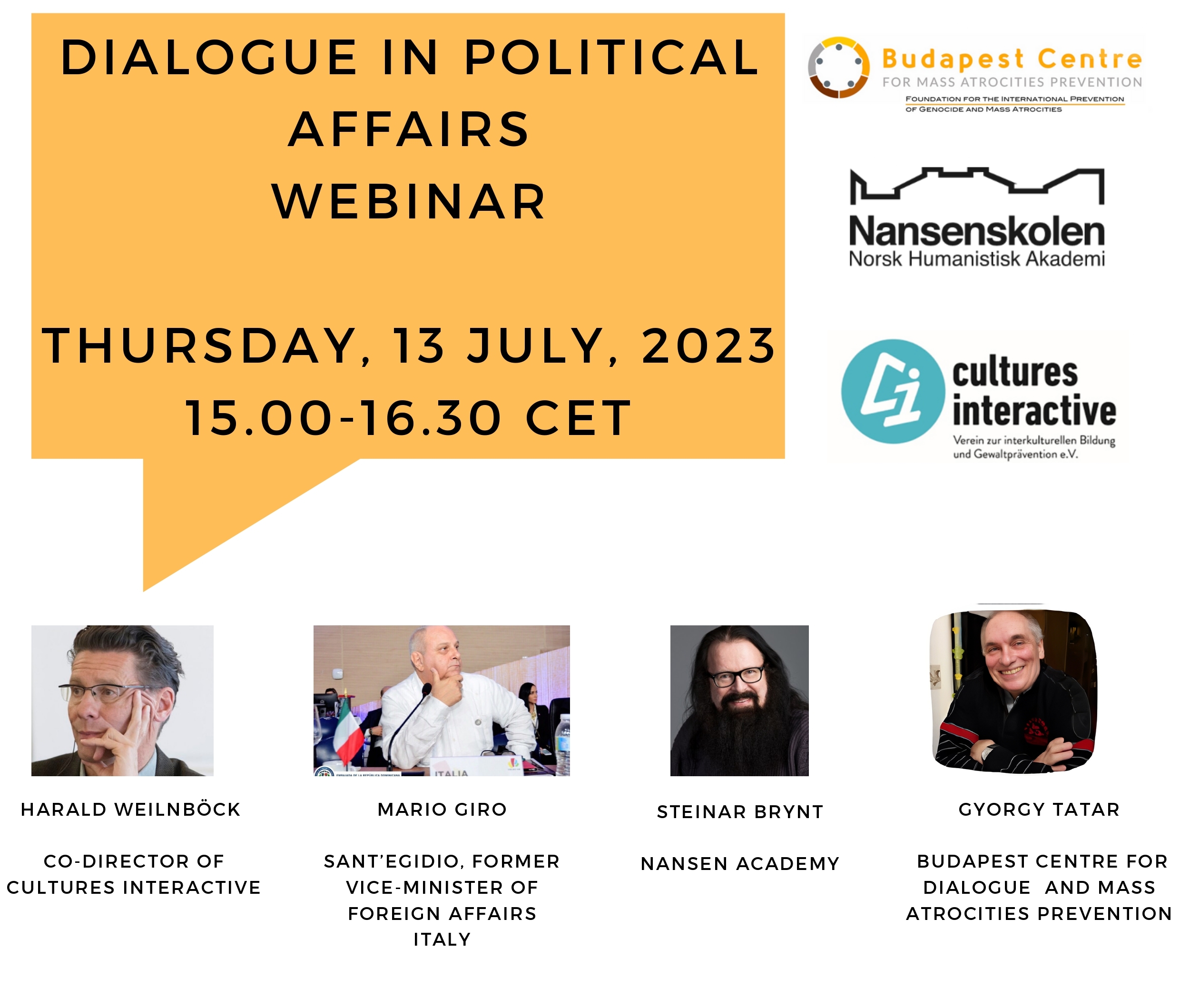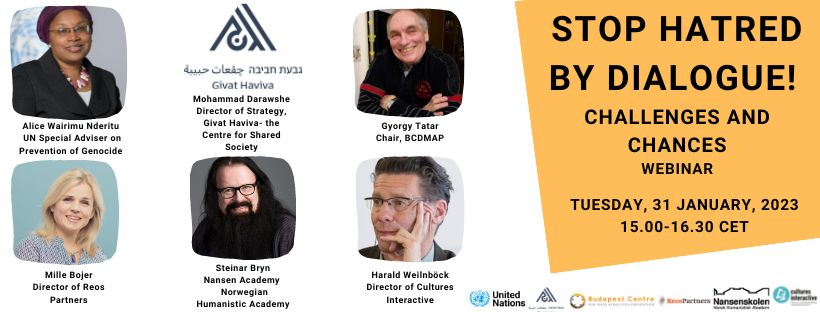- |
- Category: E-Youth Library
- |
- Category: E-Youth Library
- Click here to read the summary on this year's UN General Assembly Plenary Meeting on the Responsibility to Protect.
The 53rd regular session of the UN Human Rights Council (HRC) was held in Geneva between 19 June and 14 July 2023. As the primary international human rights body, the HRC has the capacity to prevent and respond to mass atrocity crimes, as systematic violations and abuses of human rights can be an indicator of potential genocide, war crimes, crimes against humanity or ethnic cleansing.
- Click here to read the summary which highlights major outcomes and relevant dialogues as they relate to the Responsibility to Protect (R2P), atrocity prevention and populations at risk of atrocity crimes.
- Watch here the interactive dialogue with the Special Adviser to the Secretary-General on the Prevention of Genocide, Alice Wairimu Nderitu, conducted at the 53rd Regular Session of Human Rights Council.
Source : Global Centre for the Responsibility to Protect
- |
- Category: E-Youth Library
- |
- Category: E-Youth Library
Publication of the Global Centre for the Responsibility to Protect. Click here.
PUBLICATION - Drawing on the crisis in Cameroon as an example, this article discusses how practitioners—especially policy makers and non-governmental advocates—can use the Simon-Skjodt Center’s Tools for Atrocity Prevention resource to inform and strengthen policy responses to specific cases. Click here.
VIDEO
PODCAST - Engaging with the powerful
Click here to access this episode from the Centre of Humanitarian Dialogue with Haile Menkerios.
PUBLICATION - Kristina Hook and Ernesto Verdeja examine how social media misinformation (SMM) can worsen political instability and legitimize mass atrocities. They propose several recommendations for the instability and atrocity prevention community. Click here.
- |
- Category: Events
- |
- Category: Events

Mr. Steinar Brynt (48:45 - 1:13:10) spoke about the dilemmas and similarities of the war of thenineties in Western Balkans and the war between Russia and Ukraine since 2014. He pointed to the fact that through the intensification of the conflict situation between the two countries dialogue became increasingly difficult and ultimately stopped. He touched upon issues of nation states, revival of traditionalism, possibilities and limitations of dialogue, the relationship building methodology, why we do not embrace dialogue, can dialogue be counterproductive under conflict and the need for finding a common language with those representing other concepts.
- |
- Category: Allience for Dialogue
- |
- Category: Allience for Dialogue
Draft Statement 'Alliance for Dialogue'
(launched during the Dialogue in Political Affairs webinar on July 13th 2023)
WHY
Challenges in international affairs
The post-Cold War era and unipolarity are over. The rising new world brings a wide variety of values in the forefront of international relations and increases the risks of conflicts and wars. The peaceful shaping of the new world order, growing competition and rivalry necessitate the application of additional, new communication tool between states seeking to pursue their own values and demands the introduction of additional elements in the multilateral decision-making mechanisms for jointly setting the rules which handle tensions, address emerging challenges and build a safe and free world.
Challenges in societal affairs
Lack of Mechanisms and Cooperation
The challenges could be addressed effectively by translating the culture of dialogue into daily practice. At present, however, dialogues are conducted randomly, on ad hoc basis at both national and international levels. Development of local capacities, including the training of teachers is exceptional. Moreover, the dialogue practitioners act in relative isolation, their community is fragmented. Although dialogue is an instrument for ensuring cohesion, inclusion and prevention it does not constitute an organic part of either the decision-making procedures or the national education. Neither national nor international mechanisms of dialogue are in place. That is particularly relevant in the case of entities who represent controversial values, perspectives, let alone views considered as extreme by the public discourse and mainstream politicians.
WHAT
WHO
“Controversial dialogue” is conducted between individuals and entities representing diverse, confrontational, occasionally extreme identities, ideologies, values and views. The “dialogue events” are designed and implemented by dialogue facilitators.
HOW
- Advocate for and assist in institutionalizing “controversial dialogue” in multilateral diplomacy by introducing dialogue mechanisms in the UN and the concerned international and regional institutions which will support and help prepare decisions touching upon fundamental values, human rights and cultural particularities. This instrument will operate as the entry hall/back door room of interstate negotiations where experts free of any governmental mandate explore the cores, motivations and backgrounds of controversial views, design shared visions and prepare recommendations for the decisionmakers.
- Advocate for and assist in building up decision making mechanisms at national level which include the institution of “controversial dialogue” to help address complex challenges, manage societal transformations, counter conflictual attitudes and adverse trends, and facilitate building up shared and cohesive societies.
- Advocate for including the culture of dialogue, practicing of “soft skills” (listening to each other, encouraging understanding, respect, appreciation for others etc.) in national curricula of education.
- Establish an international network which will promote the culture of dialogue and dialogic controversy by sharing knowledge, expertise, experience, enhance the interaction between dialogue facilitators and pool the available resources in the field of dialogue.
The core team of the “Alliance” prepares a draft statement to raise awareness of the need for institutionalizing “controversial dialogue” and enhancing its dissemination.
The statement will be presented during the webinar to be organized as a follow up of the webinar last January (https://www.genocideprevention.eu/en/events/476-stop-hatred-by-dialogue) and a reflection period will be launched;
Mid-July
Activists and dialogue practitioners will be invited to support the movement and make inputs;
End September
The finalized statement will be submitted by the core team to the Secretariat of the UN Secretary General;
End October
The statement will be presented/sent to the relevant regional organizations;
November onwards
The next steps will be decided on the basis of the outcomes of the steps indicated above in the framework of a webinar.
- |
- Category: E-Youth Library
- |
- Category: E-Youth Library
Publication of the Global Centre for the Responsibility to Protect. Click here.
Atrocity Alert No. 353: Syria, India and Israel and the Occupied Palestinian Territory
Publication of the Global Centre for the Responsibility to Protect. Click here.
PODCAST - practical skills
The art of creating safe spaces for difficult conversations.
Click here to access this episode from the Oslo Forum with Annette Weber
ZOOMING on ten conflicts shaking the world this year.
PUBLICATION - The United States Holocaust Memorial Museum is deeply concerned about the dire risk of genocide in Darfur, Sudan. Check here.
More information about the recent developments in Sudan here and here.
PUBLICATION - In this article, Marco Respinti sheds light on the mass atrocities which took in Bangladesh at the beginning of the 1970s, which remain to this day, unacknowledged. Click here.
- |
- Category: Events
- |
- Category: Events
Prominent practitioners shared experiences on the significance and methodologies of dialogue as well as the challenges of dialogue facilitation in the Middle East, Western Balkans, Cyprus, and Germany.
The examples highlighted dialogue as an effective tool for preventing extremism and transforming hostile and complex conflict situations into sustainable peaceful processes.Check out the programme here!
Watch the recording of the event
- |
- Category: Allience for Dialogue
- |
- Category: Allience for Dialogue
By that we continue our effort to provide space for scholars and practitioners to express their views on even controversial issues which impede the translation of the RtoP into action. Ultimately here, our goal is to provide space for the views of scholars and practitioners on the role of dialogue in bridging the conflict between universal human rights values and cultural relativism from the perspective of mass atrocity prevention.
This interview was made by Dr. Gyorgy Tatar, President of BCDMAP, and Dr. Gary Uzonyi, the senior faculty research fellow of BCDMAP.
In this second episode of the series of interviews, we had the opportunity to exchange with Dr. Karen Smith, the UN Special Adviser on the Responsibility to Protect between 2019-2021
This interview was made by Dr. Gyorgy Tatar, President of BCDMAP, and Dr. Gary Uzonyi, the senior faculty research fellow of BCDMAP.
the role of dialogue in advancing consensus on RtoP between Global North and South and the skepticism of the Global South on the activities of the International Criminal Court.
- |
- Category: E-Youth Library
- |
- Category: E-Youth Library
This event aims at raising awareness of impunity related to core international crimes, which encompass the crime of genocide, crimes against humanity and war crimes. Furthermore, it is intended to promote national investigations and prosecutions, to formally recognise the common efforts of the EU Member States and the European Union in enforcing international criminal law, to address the position and participation of victims in criminal proceedings for these crimes, and to reinvigorate Europe-wide commitment to the continuing fight against impunity for these crimes.
Watch this year's EU Day Against Impunity by clicking below.
This year, the EUDAI is part of the MLA Diplomatic Conference for the Adoption of the Convention on International Cooperation in the Investigation and Prosecution of Genocide, Crimes Against Humanity, War Crimes and other International Crimes. The aim of the Diplomatic Conference is to conduct formal negotiations that will result in the adoption of a new procedural multilateral treaty on mutual legal assistance and extradition in order to facilitate better practical cooperation between States investigating and prosecuting core international crimes.The draft Convention also foresees that State parties should establish extraterritorial jurisdiction over these types of crimes when the alleged offender is present on the State party’s territory.






